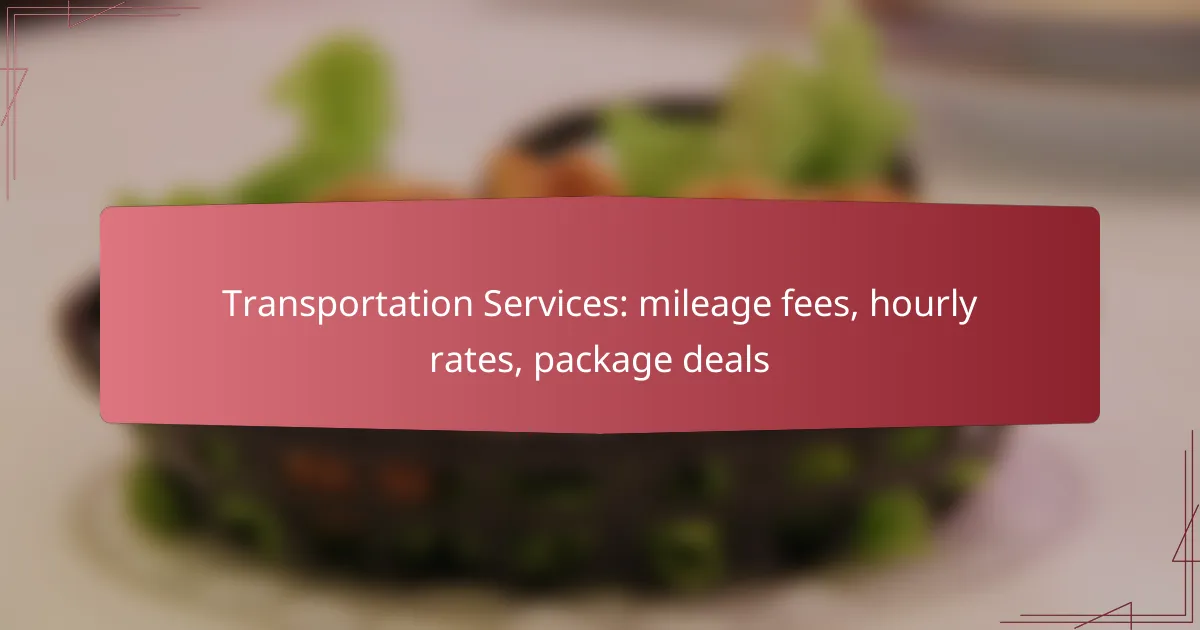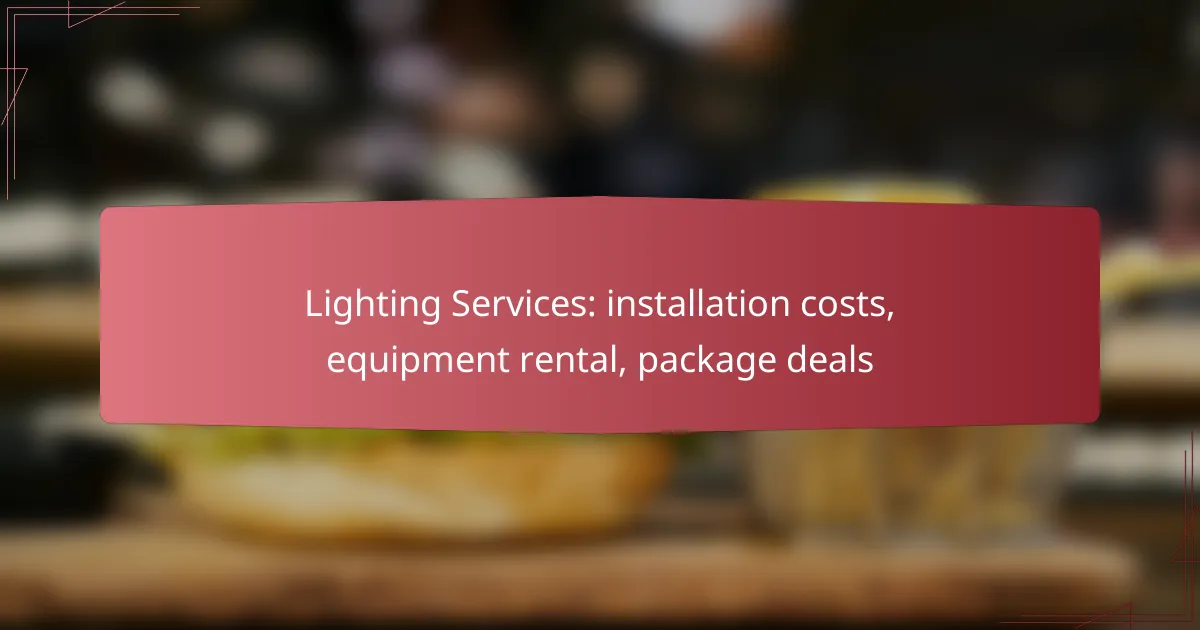Transportation services in London offer a variety of pricing structures, including mileage fees that typically range from £1 to £3 per mile, influenced by factors such as vehicle type and demand. Hourly rates generally fall between £40 and £100, depending on service level and vehicle size. Additionally, many providers offer package deals that combine multiple services at discounted rates, catering to diverse customer needs for events and travel.
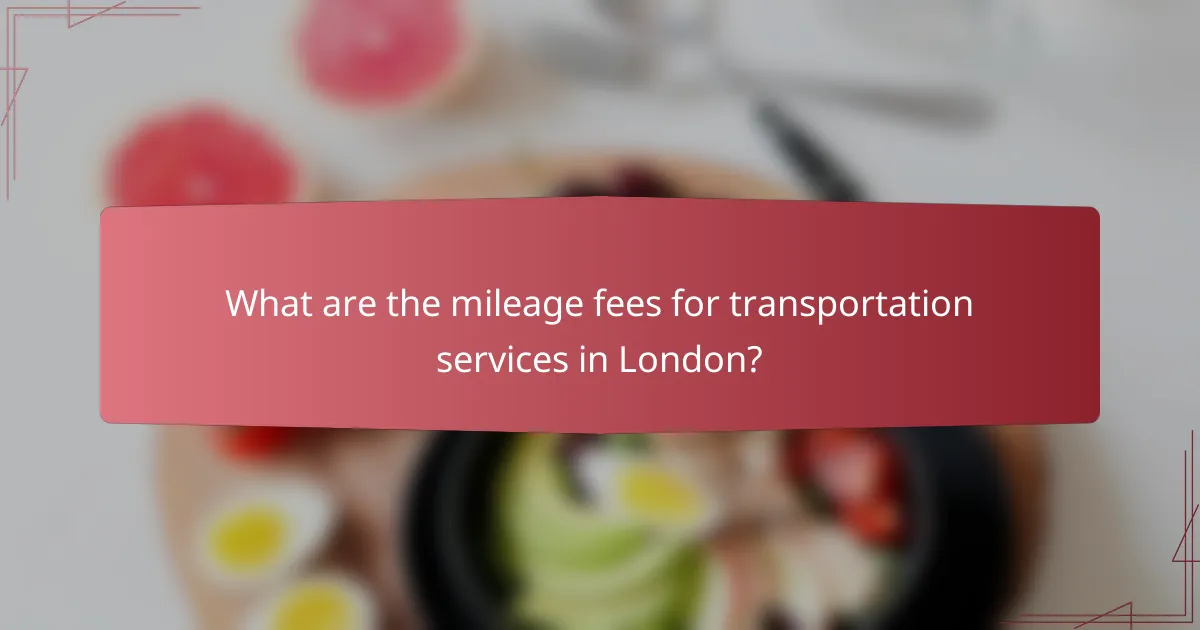
What are the mileage fees for transportation services in London?
Mileage fees for transportation services in London typically range from £1 to £3 per mile, depending on the type of vehicle and service. These fees are calculated based on the distance traveled and can vary significantly based on factors such as time of day and demand.
Standard mileage rates
In London, standard mileage rates for taxis and private hire vehicles often fall between £1.50 and £2.50 per mile. For larger vehicles or specialized services, rates may increase, sometimes reaching up to £3 per mile. It’s advisable to confirm rates with the service provider before booking.
Some transportation services offer flat rates for specific routes, which can be more economical for longer distances. Always compare the mileage fees against these fixed rates to find the best deal.
Factors affecting mileage fees
Several factors can influence mileage fees in London, including peak hours, traffic conditions, and the type of vehicle used. During rush hours, fees may increase due to higher demand and longer travel times.
Additionally, some companies may charge extra for waiting time or specific services, such as luggage handling. Always inquire about any potential additional fees when booking your transportation to avoid surprises.
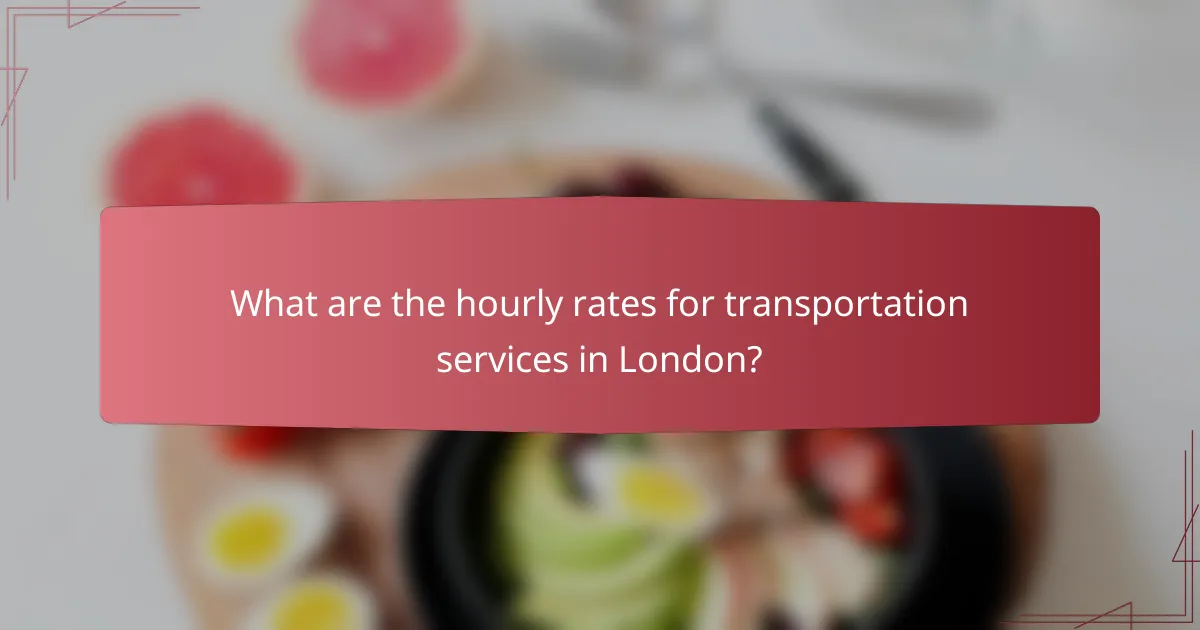
What are the hourly rates for transportation services in London?
Hourly rates for transportation services in London typically range from £40 to £100, depending on the type of vehicle and service level. Factors such as vehicle size, service type, and demand can influence these rates significantly.
Typical hourly rates
In London, standard hourly rates for private hire vehicles generally start around £40 for basic services. Luxury vehicles or specialized transport can command rates upwards of £80 to £100 per hour. It’s advisable to compare quotes from different providers to find the best deal for your needs.
Peak vs off-peak pricing
Transportation services in London often have different pricing structures for peak and off-peak hours. During peak times, such as weekday mornings and evenings, rates can increase by 20% to 50% compared to off-peak hours. Off-peak times, typically mid-morning or late evening, offer more affordable rates and greater availability.
When booking, consider your schedule and whether you can travel during off-peak hours to save money. Always confirm the pricing details with your service provider to avoid unexpected charges.

What package deals are available for transportation services in London?
In London, transportation services often offer package deals that combine various services at a discounted rate. These packages can include airport transfers, hourly rentals, and special event transportation, providing customers with flexible options tailored to their needs.
Common package options
Common package options in London transportation services include airport transfer bundles, which typically cover round trips to major airports like Heathrow and Gatwick. Hourly rental packages are also popular, allowing customers to book a vehicle for a set number of hours, often with a reduced rate for longer bookings.
Additionally, some companies offer special event packages for weddings, corporate events, or sightseeing tours. These packages may include extras such as complimentary drinks, decorations, or guided tours, enhancing the overall experience.
Discounts for long-term bookings
Many transportation services in London provide discounts for long-term bookings, which can significantly reduce costs. For instance, booking a vehicle for a week or more may lead to savings of 10-20% compared to daily rates.
When considering long-term bookings, it’s advisable to compare different providers, as some may offer better rates or additional perks. Always check the terms and conditions to ensure there are no hidden fees or restrictions that could affect your overall savings.

How do mileage fees compare to hourly rates?
Mileage fees charge based on the distance traveled, while hourly rates are calculated based on the time spent. Choosing between these two pricing models depends on the nature of the trip and the expected duration or distance.
Cost-effectiveness analysis
To determine which pricing model is more cost-effective, consider the distance and time involved in your transportation needs. For short trips with minimal distance, hourly rates may be more economical, while longer journeys often favor mileage fees.
For example, if a trip takes less than an hour but covers a significant distance, mileage fees could result in higher costs compared to a flat hourly rate. Conversely, if a trip is lengthy but involves minimal stops, mileage fees might be the better option.
Best scenarios for each pricing model
Hourly rates are ideal for situations where the duration is unpredictable, such as waiting times at appointments or multiple stops. They provide a clear structure for trips that may extend beyond initial estimates.
Mileage fees work best for straightforward, point-to-point travel where the distance is known and can be easily calculated. For instance, airport transfers or long-distance travel are often more economical under this model.
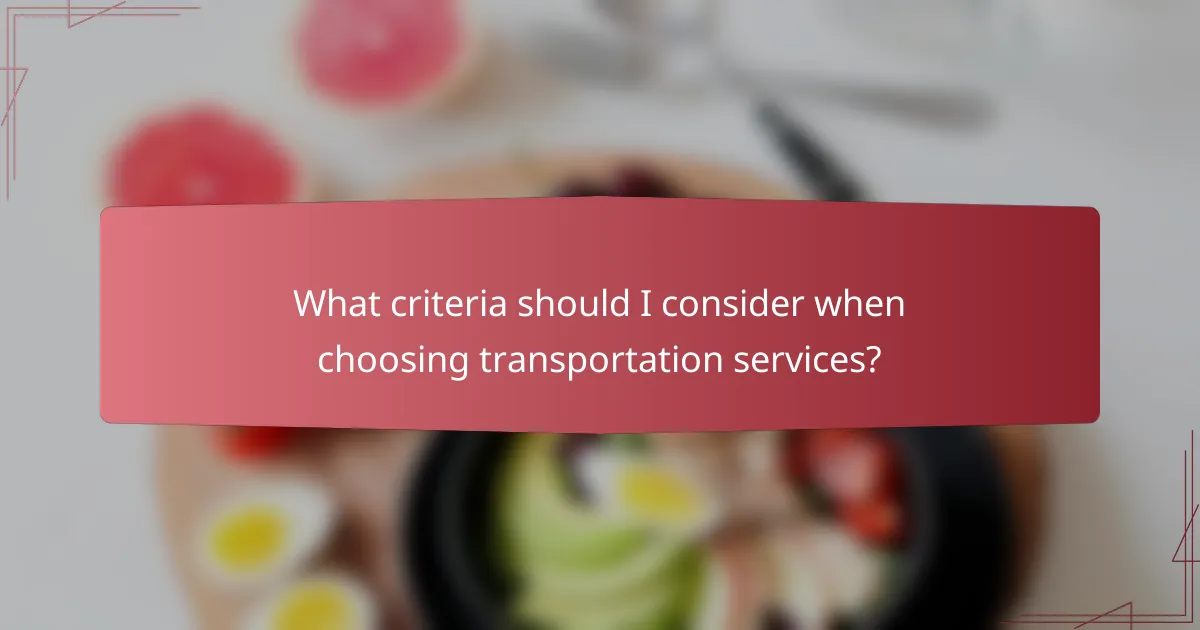
What criteria should I consider when choosing transportation services?
When selecting transportation services, consider factors such as service reliability, customer reviews, pricing structures, and the specific needs of your journey. These criteria will help ensure you choose a service that meets your expectations and requirements.
Service reliability
Service reliability is crucial when choosing transportation options. Look for companies that have a track record of punctuality and consistency in their operations. Reliable services often provide real-time tracking, allowing you to monitor your vehicle’s location and estimated arrival time.
To gauge reliability, check if the service has a history of cancellations or delays. A good rule of thumb is to select companies with a cancellation rate below 10% and positive feedback regarding their timeliness. This can significantly impact your travel experience, especially for important appointments or events.
Customer reviews
Customer reviews offer valuable insights into the quality of transportation services. Look for platforms where users share their experiences, such as Google Reviews or Yelp. High ratings and positive comments often indicate a trustworthy provider, while consistent negative feedback can be a red flag.
Pay attention to specific aspects mentioned in reviews, such as driver professionalism, vehicle cleanliness, and overall customer service. A service with a strong reputation for customer satisfaction is more likely to meet your expectations. Aim for companies with an average rating of at least 4 out of 5 stars to ensure a positive experience.

What are the typical response times for transportation services?
Typical response times for transportation services can vary widely based on location, demand, and the type of service requested. In urban areas, response times often range from a few minutes to over an hour, depending on traffic conditions and the availability of vehicles.
Average response times in London
In London, average response times for transportation services generally fall between 10 to 30 minutes during peak hours. Outside of rush hour, this can improve to around 5 to 15 minutes. Factors such as location within the city and the specific service type can further influence these times.
Factors influencing response times
Several factors can impact the response times of transportation services. Traffic congestion, time of day, and weather conditions are significant contributors. For example, heavy rain or snow can lead to longer wait times due to slower driving conditions.
Additionally, the type of service requested plays a role. Ride-hailing services may have quicker response times compared to traditional taxi services, which might require more time to dispatch a vehicle. Understanding these factors can help users better estimate wait times and plan accordingly.
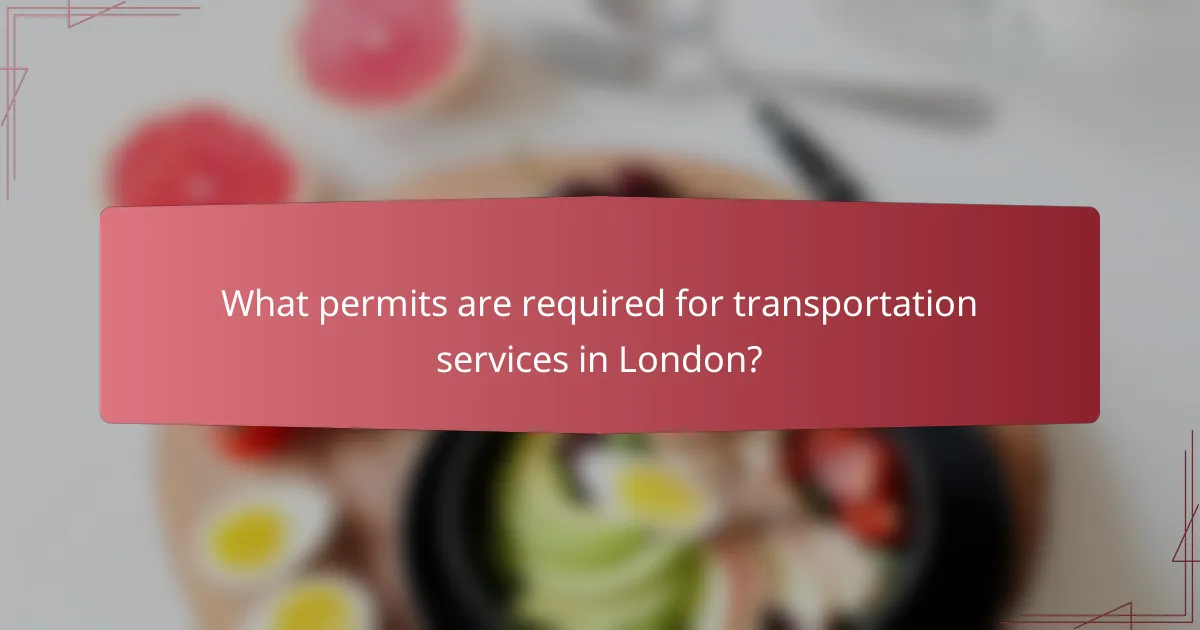
What permits are required for transportation services in London?
In London, transportation services require specific permits to operate legally. These permits ensure compliance with local regulations and safety standards, which vary depending on the type of service provided.
Necessary permits for drivers
Drivers in London must obtain a Private Hire Vehicle (PHV) license or a Taxi Driver’s license, depending on their service type. The PHV license is essential for drivers working with private hire companies, while taxi drivers need a specific license issued by Transport for London (TfL).
To acquire these licenses, drivers must pass background checks, medical examinations, and knowledge tests. It’s crucial to ensure that all documentation is up-to-date to avoid penalties.
Regulations for transportation companies
Transportation companies in London must be licensed by TfL and adhere to strict operational regulations. These include maintaining insurance coverage, ensuring vehicle safety, and conducting regular inspections.
Additionally, companies must keep accurate records of their operations, including driver details and customer feedback. Non-compliance can result in fines or loss of license, so staying informed about regulatory changes is essential.
